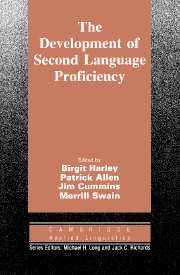Book contents
- Frontmatter
- Contents
- List of contributors
- Series editors' preface
- Acknowledgments
- Introduction
- I THE NATURE OF LANGUAGE PROFICIENCY
- II CLASSROOM TREATMENT
- III SOCIAL AND INDIVIDUAL VARIABLES
- IV PRACTICAL AND POLICY IMPLICATIONS
- V THIRTY-FIVE YEARS OF RESEARCH ON BILINGUALISM
- CONCLUSION
- References
- Author Index
- Subject Index
Series editors' preface
Published online by Cambridge University Press: 05 October 2012
- Frontmatter
- Contents
- List of contributors
- Series editors' preface
- Acknowledgments
- Introduction
- I THE NATURE OF LANGUAGE PROFICIENCY
- II CLASSROOM TREATMENT
- III SOCIAL AND INDIVIDUAL VARIABLES
- IV PRACTICAL AND POLICY IMPLICATIONS
- V THIRTY-FIVE YEARS OF RESEARCH ON BILINGUALISM
- CONCLUSION
- References
- Author Index
- Subject Index
Summary
For some years now, the Modern Language Centre of the Ontario Institute for Studies in Education (OISE), Toronto, Canada, has played a leadership role internationally in the study of education in and through a second language. Thus, the recent completion of a major five-year OISE study of the development of bilingual proficiency in school-age children naturally attracted considerable interest among researchers and educators alike. We are pleased to publish here the findings of that project, together with expert reaction papers and discussion of the implications for practice.
The Development of Bilingual Proficiency (DBP) project consisted of a series of related studies in three major areas: the components of second language proficiency, the effects of classroom instruction on second language learning, and the relationship of proficiency to age differences and social-environmental factors. The project involved several source and target languages (English, Spanish, French, Portuguese, and Japanese) and a variety of different types of language programs. Along the way, the research team addressed several key methodological issues, including validation of the COLT (Communicative Orientation of Language Teaching) classroom observation scheme.
As the DBP project was nearing completion in November 1987, a symposium was convened at OISE at which experts critiqued the different studies in a series of invited reaction papers. Their contributions also helped relate the project findings to broader issues in second language acquisition and in bilingual and immersion education and went on to consider implications for policy and practice.
- Type
- Chapter
- Information
- The Development of Second Language Proficiency , pp. xi - xiiPublisher: Cambridge University PressPrint publication year: 1990



